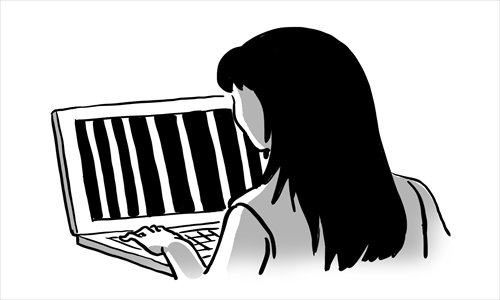Path to freedom of speech fraught with jeopardies

Illustration: Liu Rui/GT
The detention of singer Wu Hongfei for a Weibo post threatening to blow up two Beijing municipal government agencies and a bunch of people she hates has aroused a new wave of attention on freedom of speech in China.
Public opinion is split over whether Wu's words posed a real danger to public security and if they should lead to legal consequences.
Wu's lawyer claimed her words were impulsive and she should not face any punishment. To some, it would be another blow to China's freedom of speech if Wu was sentenced.
Wu's threatening remarks were made against the background of several violent cases recently in Beijing and other cities in which innocent people were targeted in random attacks. The debate about how Wu's case should be approached attests to the dilemma authorities face to secure public order and maintain freedom of speech.
In any sense, threatening violent attacks on a public forum is challenging the boundaries of what is tolerable. This is especially so for China which is still groping the limits of freedom of speech.
Like other countries that are undergoing a fast transformation, China is confronting the dramatic changes surrounding such freedoms.
Much of the public seems to have a rather fixed idea of what freedom of speech should mean in China.
As an editor, I receive article submissions all the time. When an article is rejected, I often receive replies from authors saying "I understand, it's a sensitive issue."
Admittedly, there are no-go areas for Chinese media, but articles can also be rejected due to irrelevance or other articles about the same subject having recently been published.
Defying long-held misconceptions, issues such as political reform, ethnicity and government policies are debated in Chinese media today.
In foreign affairs for example, the media have taken up diverse stances, many of them at odds with official diplomatic rhetoric.
While media professionals are striving to expand freedom of speech, regulators are confronting the new challenge of how to properly manage such freedom.
Compared with repercussions caused by restrictions, the concern over a lack of proper management is much less pronounced among the public and intellectuals.
Lessons drawn from the Cultural Revolution (1966-76) are often cited as examples of freedom of speech being stifled. But this was also a time when radical views made the whole country pay a very high price.
Heavy regulation in the past has seemingly put authorities in an awkward position, where any interference in the expression of a media outlet or individuals is seen as an attempt to suppress freedom of speech. The rapid development of the Internet has not only facilitated the free exchange of ideas, but also helped the spread of radical viewpoints.
Recently, during several cases of anti-society attack, some opinion leaders have virtually cheered on the brutality.
The issue is further complicated by ideological confusion in China. It is also tangled with poor governance by many local government agencies.
After Wu made her threats against government agencies, hollow or not, she has received abundant support by liberal opinion leaders.
In cyberspace, the pressure felt from majority views against minority opinions seems to be more suffocating than the pressure coming from the regulators.
Whether Wu's threatening remarks posed a danger to public order is open for debate. But making explosive statements at a time when society is full of angry sentiments clearly doesn't help.
Public figures should take more responsibility to help maintain rational expression on such public forums
Nobody is really against freedom of speech in China. Protecting it is not at odds with managing it properly. But it must be clearly defined, and the absence of such definitions is partly to blame for the chaotic public opinion sphere in China.
Freedom of speech followed a long, winding path in many countries. Its boundaries are often defined by a string of landmark cases. Wu's case might be one of these.
The author is a commentator with the Global Times. opinion@globaltimes.com.cn